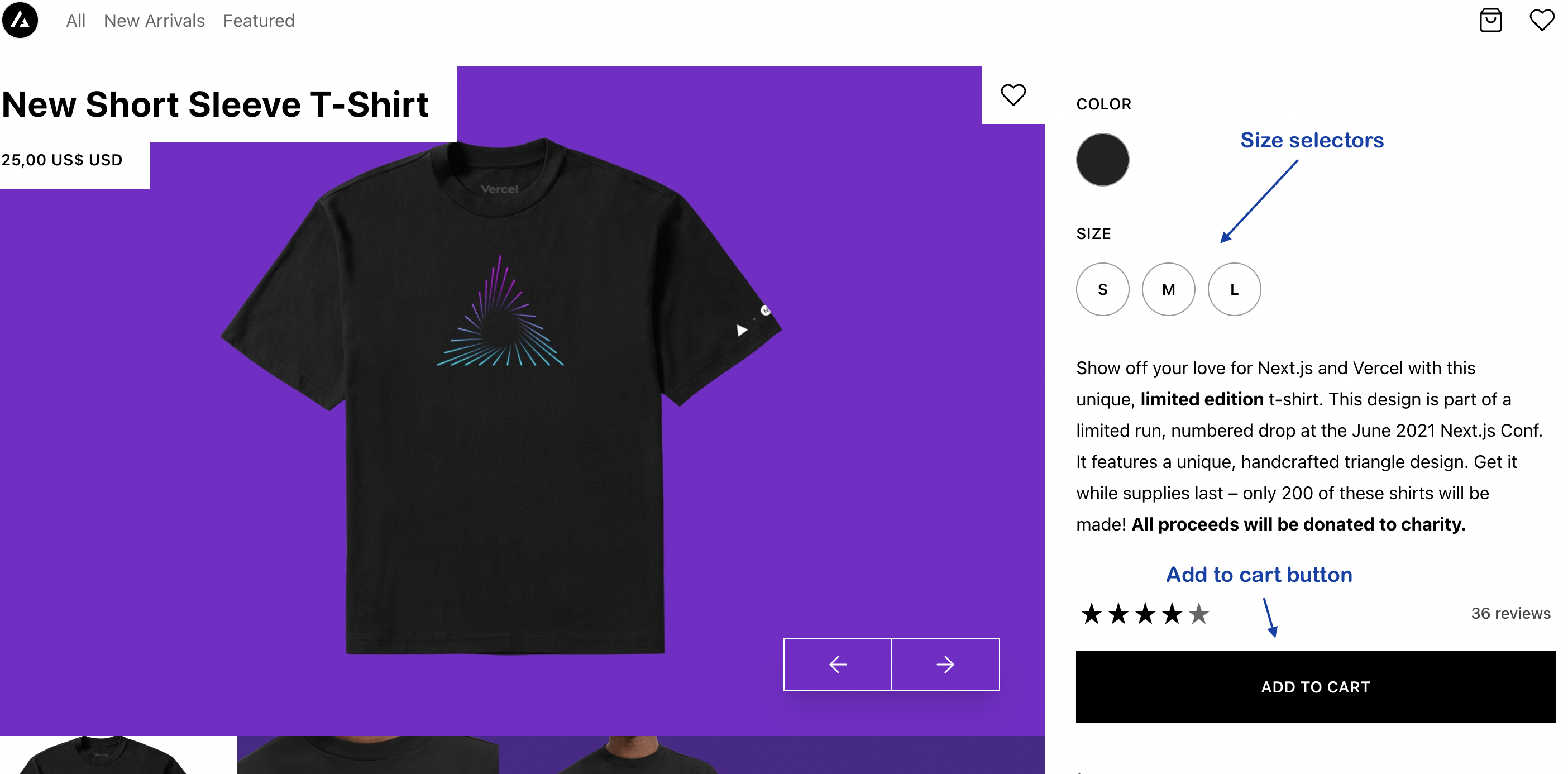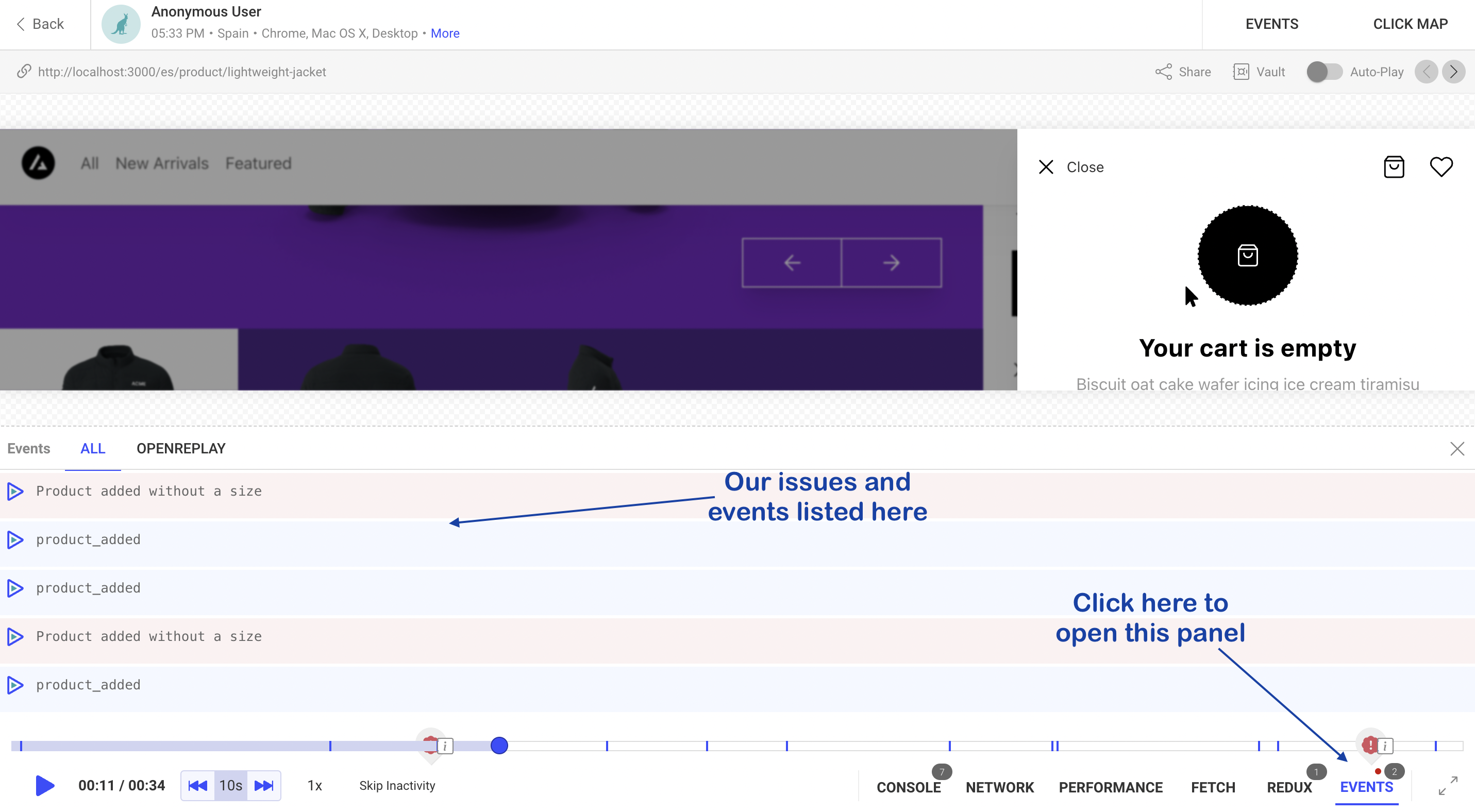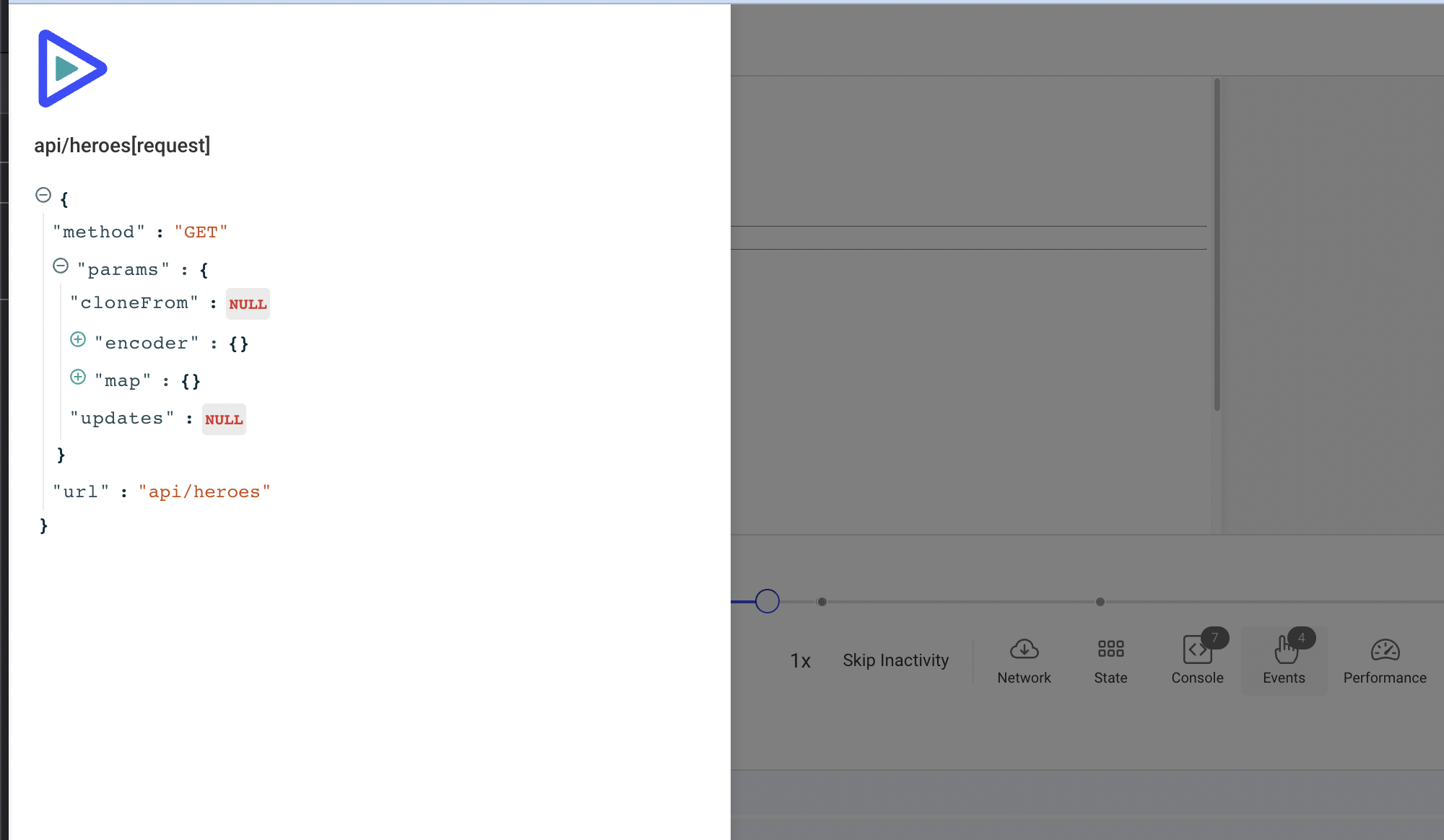Using Custom Events to Enhance your Tracking
Custom events are a straightforward yet powerful concept that our Tracker provides without having to add anything extra. They can extend the tracked data with whatever else you need, be it custom errors related to your business logic or even simple events, to be aware of what your users are doing.
Our tracker, by default, will keep tabs on many different things, including some useful errors, but they might not be enough for you, which is why we have custom events.
Adding custom events
Section titled Adding custom eventsFor this example, let’s take a generic e-commerce site and add some events to understand when our user adds a product to the shopping cart.
By default, OpenReplay will not track that information. However, through custom events, you can easily keep track of this.
For this tutorial, we’ll use a Next.js project set up following the same architecture as in the Next.js tutorial, so feel free to check it out if you haven’t.
Creating the Tracker Provider
Section titled Creating the Tracker ProviderThe logic inside this file is fully explained in this tutorial.
All you need to know now, is that this is a context provider we’re creating that will allow you to interact with the tracker through multiple functions.
In particular, we’re going to care about logIssue and logEvent which allow you to send a custom issue or event down to the platform.
- Events are meant to log user-specific actions. In our, case for instance, we’ll log the addition of a product into the cart.
- Issues, on the other hand, are meant to log errors that our tracker does not automatically pick up. In our case, we’ll simulate a networking error preventing us from accessing a 3rd party API. When that happens, we’ll log an issue on the platform.
import { createContext, useCallback } from 'react'
import Tracker from '@openreplay/tracker'
import { v4 as uuidV4 } from 'uuid'
import { useReducer } from 'react'
export const TrackerContext = createContext()
function defaultGetUserId() {
return uuidV4()
}
function newTracker(config) {
const getUserId =
config?.userIdEnabled && config?.getUserId
? config.getUserId
: defaultGetUserId
let userId = null
const trackerConfig = {
projectKey:
config?.projectKey || process.env.NEXT_PUBLIC_OPENREPLAY_PROJECT_KEY,
}
if (config?.ingestPoint || process.env.NEXT_PUBLIC_OPENREPLAY_INGEST_POINT) {
trackerConfig.ingestPoint =
config?.ingestPoint || process.env.NEXT_PUBLIC_OPENREPLAY_INGEST_POINT
}
console.log('Tracker configuration: ')
console.log(trackerConfig)
const tracker = new Tracker(trackerConfig)
if (config?.userIdEnabled) {
userId = getUserId()
tracker.setUserID(userId)
}
return tracker
}
function reducer(state, action) {
switch (action.type) {
case 'init': {
if (!state.tracker) {
console.log('Instantiaing the tracker for the first time...')
let t = newTracker(state.config)
let pluginsReturnedValue = {}
if (state.config.plugins) {
state.config.plugins.forEach((p) => {
console.log('Using plugin...')
pluginsReturnedValue[p.name] = t.use(p.fn(p.config))
})
}
return {
...state,
pluginsReturnedValue: pluginsReturnedValue,
tracker: t,
}
}
return state
}
case 'start': {
console.log('Starting tracker...')
state.tracker.start()
return state
}
case 'logEvent': {
console.log('Logging event')
state.tracker?.event(action.payload?.name, action.payload?.data)
return state
}
case 'logIssue': {
console.log('Logging issue')
state.tracker?.issue(action.payload?.name, action.payload?.data)
return state
}
}
}
export default function TrackerProvider({ children, config = {} }) {
let [state, dispatch] = useReducer(reducer, {
tracker: null,
pluginsReturnedValue: {},
config,
})
let value = {
startTracking: () => dispatch({ type: 'start' }),
initTracker: () => dispatch({ type: 'init' }),
logEvent: (evnt) => dispatch({ type: 'logEvent', payload: evnt }),
logIssue: (evnt) => dispatch({ type: 'logIssue', payload: evnt }),
pluginsReturnedValues: { ...state.pluginsReturnedValue },
}
return (
<TrackerContext.Provider value={value}>{children}</TrackerContext.Provider>
)
}The logEvent and logIssue functions have the same signature, we’ll pass an object with name and data properties. The name will be used to identify our record in OpenReplay’s UI and the data will contain the information logged.
Remember: the data property must contain a serializable object.
We can then set up this provider in our _app.tsx file like this:
//imports here...
export default function MyApp({ Component, pageProps }: AppProps) {
const Layout = (Component as any).Layout || Noop
useEffect(() => {
document.body.classList?.remove('loading')
}, [])
return (
<TrackerProvider config={{}}>
<Head />
<ManagedUIContext>
<Layout pageProps={pageProps}>
<Component {...pageProps} />
</Layout>
</ManagedUIContext>
</TrackerProvider>
)
}With that out of the way, we can now move on to trigger the events.
Logging custom issues and events
Section titled Logging custom issues and eventsFor this, we’ll take advantage of our UI:

We’ll record a new event every time the user adds a product to our cart (essentially when they hit the “ADD TO CART” button).
And we’ll log an issue, if they do so without selecting a size first.
You can check out the complete source code of this component right here, but let’s focus on the logic we’ll add.
At the start of our component we’ll use the useContext hook:
//outside the component
import { TrackerContext } from '../../../context/trackerProvider'
//inside the component
const { logEvent, logIssue } = useContext(TrackerContext)Inside the addToCart function, we’ll add the following logic to check if there is no valid size selected:
const validSizes = product.options
.filter((o) => o.id == 'option-size')
.map((o) => o.values)[0]
let pickedSized = validSizes.find((s) => {
return selectedOptions.size == s.label.toLowerCase()
})
if (!pickedSized) {
logIssue({
name: 'Product added without a size',
data: {
product_id: product.id,
added_date: new Date(),
available_options: validSizes,
},
})
}The key part of the code, is the last IF, when we realize there is no valid size selected, we call the logIssue function, which we got from the useContext call from before.
And for the even, we’ll go deeper into the same function and we’ll add:
logEvent({
name: 'product_added',
data: {
id: product.id,
date_added: new Date(),
},
})That’s all we need, we can then go to OpenReplay, find our session recording, and inspect the Events section:

And if we want the details, we can click on the “DETAILS” link that appears when you hover over one of the rows:

Those are the details we recorded when adding a product.
Remember to check out the full Next.js tutorial if this is the first time you’re using OpenReplay with this framework.
And if you’d like to review the full source code of this example, you can find it here.
Have questions?
Section titled Have questions?If you have any issues with custom events in you project, please contact us on our Slack community and ask our devs directly!